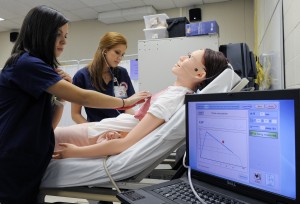
The University of Mississippi Medical Center’s School of Nursing MAD PIPE program is scheduled to begin in fall 2015.
OXFORD, Miss. – Boldly responding to the severe shortage of advanced practice nurse leaders and the prevalence of multiple chronic conditions statewide, the University of Mississippi Medical Center’s School of Nursing has developed an innovative new pathway to the Doctor of Nursing Practice degree.
Robin Wilkerson, director of the nursing school’s program on the university’s Oxford campus, has been awarded a $1.125 million Health Resources and Services Administration grant to develop the Mississippi Accelerated DNP Pathways Integrating Interprofessional Education, or MAD PIPE, program.
The three-year grant, from the primary federal agency for improving access to health care services for people who are uninsured, isolated or medically vulnerable, runs from 2014 to 2017. Eva Tatum, assistant professor of nursing, is the project manager.
“The purpose of this project is to increase the nursing leadership capacity in Mississippi for addressing the health care needs of persons with multiple chronic conditions by providing expanded interprofessional educational opportunities in an accelerated Doctor of Nursing Practice curriculum,” Wilkerson said. “The proposed project will expand the current UMMC SON DNP program. The program will officially begin in fall 2015.”
Students who already have a bachelor’s degree in any field and have the prerequisites for the accelerated BSN portion of the program are eligible to apply. This also includes students who will complete a bachelor’s degree before fall 2015.
“For the accelerated BSN program, applicants must complete 62 hours of prerequisite coursework,” Tatum said. “However, many of these prerequisites are classes that were more than likely completed in the previous bachelor’s program.”
In order to progress through to the DNP portion of the program, students must pass the NCLEX-RN to be licensed as a registered nurse upon completion of the BSN, Wilkerson said. The student will also need to take the GRE before beginning the DNP portion of the program.
Once admitted into the accelerated BSN program, students must complete 48 credit hours, 765 clinical hours and a full-time plan of study for three semesters (one year). Requirements for the DNP portion are 68 to 84 credit hours, a full-time plan of study for nine semesters (three years) and 1,050 to 1,245 hours of clinical residency and capstone hours, depending on the track chosen.
UM administrators linked to the MAD PIPE program expressed their support of the effort.
“Several of us are passionate about the benefit of interprofessional education,” said Teresa Carithers, associate dean of the School of Applied Sciences. “We hope this is just the beginning of educating our entire campus on the value of interdisciplinary interprofessional collaboration within academic, research and clinical applications.”
Interprofessional education programs have proven to produce better health care providers once students enter public or private practice.
“The School of Pharmacy and School of Nursing have worked together for many years creating inter-professional educational opportunities for our students,” said Kim Adcock, director of faculty and academic affairs and associate professor of pharmacy practice. “Teaching and learning from each other, the students become part of a health care team working together to the benefit of patients.”